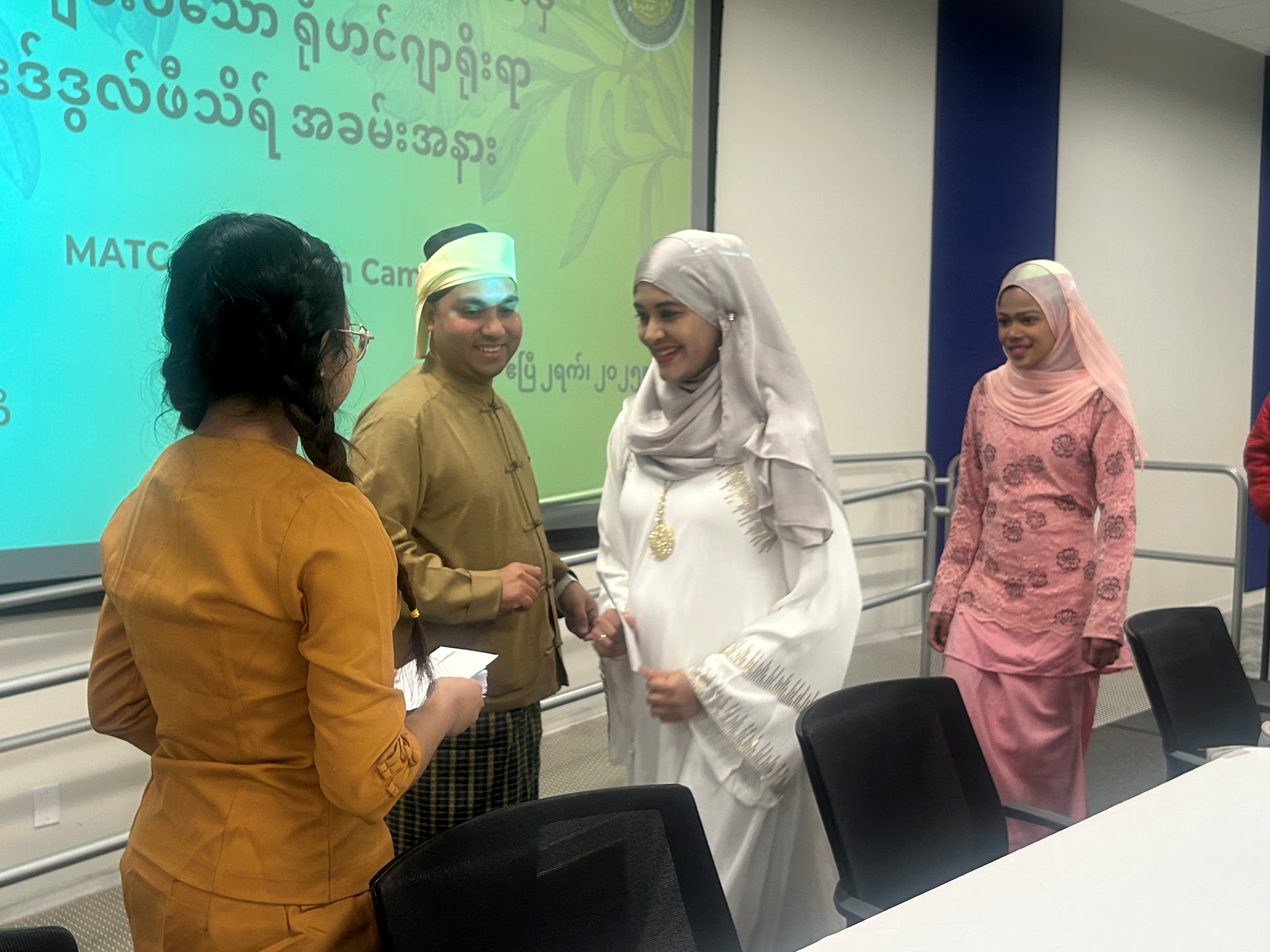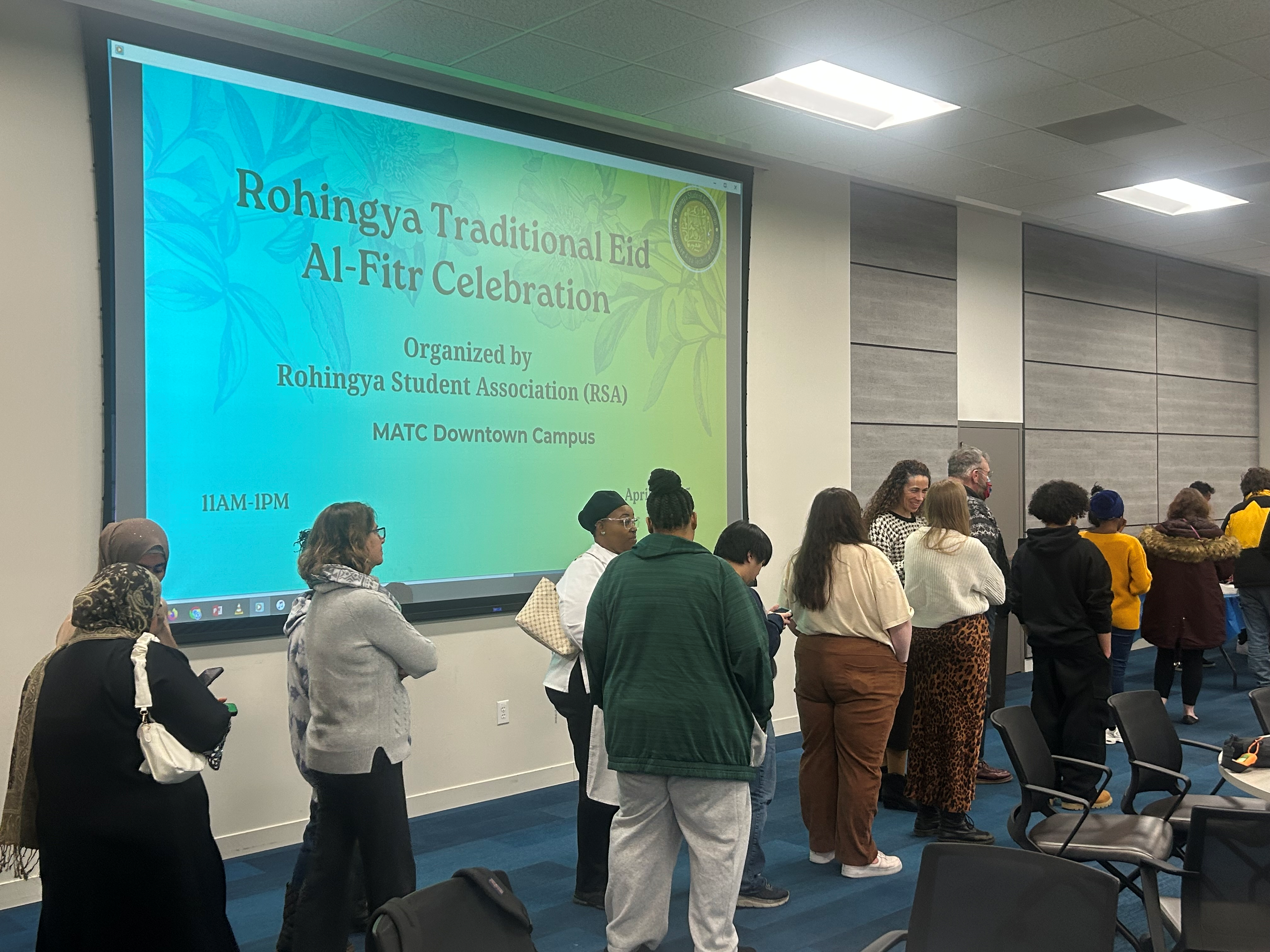
We aspire to encourage as many Rohingya students as possible to enroll at MATC, allowing them to become successful in the professional landscape and to bring their diverse perspectives to our campus.
Zar Ni Ko positively beamed as he watched a group of children shyly form a line near him. His smile got even bigger as they came forward and he handed each child a small envelope, an act of giving by Muslims on Eid al-Fitr, a feast celebrating the end of Ramadan, Islam’s holy month of fasting.
“This is a day of celebration, family and tradition,” Ko said. “It’s a time to bring peace, joy and comfort.”
On Wednesday, April 2, Ko shared that peace and joy with nearly 200 people at Milwaukee Area Technical College’s Downtown Milwaukee Campus. Students, faculty and staff, along with community members, gathered to learn about the Eid al-Fitr celebration and share traditional food at an event sponsored by the college’s Rohingya Student Association.
The Rohingya people are a predominantly Muslim ethnic group who reside in Myanmar, the nation formerly known as Burma. The United Nations has called the Rohingya the most persecuted people in the world: Thousands of them have been killed, raped, tortured and abused by Myanmar’s military leadership. Today more than 75% of the Rohingya live in exile.
Milwaukee has become home to one of the largest contingents of Rohingya refugees in the United States, and many of them have come to MATC. In the fall of 2023, the college approved the nation’s first collegiate Rohingya student association, said Ko, who is president of the organization.
“Our goal is to create a secure and supportive platform for Rohingyas to pursue education, develop skills, and cultivate their talents,” Ko said. “We aspire to encourage as many Rohingya students as possible to enroll at MATC, allowing them to become successful in the professional landscape and to bring their diverse perspectives to our campus.”
Wednesday’s event was another chance to share their culture, Ko said.
Abdul Hamid, who works as a medical interpreter for Aurora Health Care in Milwaukee, explained the history of the Rohingya people from the Middle Ages to the present day.
Hamid also represents Wisconsin at the Refugee Congress, a national nonpartisan organization built and led by refugees, asylum seekers and other forcibly displaced people.
To combat the abuse and suffering inflicted on the Rohingya, Hamid urges young Rohingya to attend college. “We look to the educated people to help us,” he said.
Hnin Yati Aung, an MATC student and event coordinator for the student association, explained how the Rohinyga perform charitable acts, buy new clothes, pray, visit relatives and prepare traditional foods to celebrate the end of Ramadan.
The guests sampled some traditional foods at the event, feasting on a buffet that included sticky rice, coconut milk jelly and malabar chai tea.
This year’s celebration is bittersweet for Myanmar, Aung said. Thousands of Myanmar residents were killed, injured or left homeless by a massive earthquake that rocked the nation on March 28. Guests at the event observed a moment of silence to remember the victims.
“People needed to pray in the street because mosques had been toppled,” she said.
The entire event was planned and coordinated by Rohingya students, said Sawsan Rizeq, the college’s supervisor of retention coaching services. “Many of them go to school, work and take care of their families,” she said. “This shows it’s also important to them to give back to their community.”
About MATC: As Wisconsin’s largest technical college and one of the most diverse two-year institutions in the Midwest, Milwaukee Area Technical College is a key driver of southeastern Wisconsin’s economy and has provided innovative education in the region since 1912. More than 30,000 students per year attend the college’s four campuses and community-based sites or learn online. MATC offers affordable and accessible education and training opportunities that empower and transform lives in the community. The college offers more than 180 academic programs — many that prepare students for jobs immediately upon completion and others that provide transfer options leading to bachelor’s degrees with more than 40 four-year colleges and universities. Overwhelmingly, MATC graduates build careers and businesses in southeastern Wisconsin. The college is accredited by the Higher Learning Commission.


